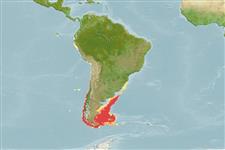Teleostei (teleosts) >
Perciformes/Notothenioidei (Icefishes) >
Nototheniidae (Cod icefishes) > Nototheniinae
Etymology: Patagonotothen: Composed from Patagonia, the Argentinian province + Greek,noton = back + Greek, adverbial particle, then, that denotes distance or removal (Ref. 45335).
More on author: Richardson.
Environment: milieu / climate zone / depth range / distribution range
Ecology
Marine; benthopelagic. Subtropical
Southeast Pacific and Southwest Atlantic: Chilean and Argentine Patagonia.
Size / Weight / Age
Maturity: Lm ? range ? - ? cm
Max length : 28.0 cm TL male/unsexed; (Ref. 56972); max. published weight: 311.00 g (Ref. 124534)
Dorsal spines (total): 5; Dorsal soft rays (total): 32; Anal spines: 0; Anal soft rays: 30. Scale on lateral line 43 (upper), 8 (lower). Caudal fin subtruncate. Body brownish above and paler below, with irregular broad dark blotches on body. First dorsal fin with a black spot covering greater part of it. First dorsal and caudal fins variegated with series of small dark spots (Ref. 27363).
Males guard the nesting sites (Ref. 57915).
Life cycle and mating behavior
Maturity | Reproduction | Spawning | Eggs | Fecundity | Larvae
Male parental care (Ref. 57915).
Hureau, J.-C., 1985. Nototheniidae. p. 323-385. In W. Fischer and J.C. Hureau (eds.) FAO species identification sheets for fishery purposes. Southern Ocean (Fishing areas 48, 58 and 88). Rome. Vol. 2:233-470. (Ref. 2807)
IUCN Red List Status (Ref. 130435: Version 2024-1)
Threat to humans
Harmless
Human uses
Tools
Special reports
Download XML
Internet sources
Estimates based on models
Preferred temperature (Ref.
123201): 4.7 - 9.7, mean 6.1 °C (based on 210 cells).
Phylogenetic diversity index (Ref.
82804): PD
50 = 0.5001 [Uniqueness, from 0.5 = low to 2.0 = high].
Bayesian length-weight: a=0.00631 (0.00370 - 0.01075), b=3.23 (3.08 - 3.38), in cm total length, based on LWR estimates for this species & (Sub)family-body (Ref.
93245).
Trophic level (Ref.
69278): 3.8 ±0.6 se; based on size and trophs of closest relatives
Resilience (Ref.
120179): Medium, minimum population doubling time 1.4 - 4.4 years (Fec = 7,634).
Fishing Vulnerability (Ref.
59153): Low vulnerability (18 of 100).
Nutrients (Ref.
124155): Calcium = 67.8 [42.8, 123.6] mg/100g; Iron = 0.955 [0.625, 1.543] mg/100g; Protein = 17.8 [16.5, 19.2] %; Omega3 = 0.382 [0.230, 0.607] g/100g; Selenium = 29.4 [15.4, 57.0] μg/100g; VitaminA = 39 [14, 114] μg/100g; Zinc = 0.91 [0.67, 1.23] mg/100g (wet weight);
